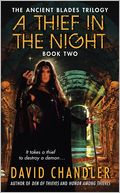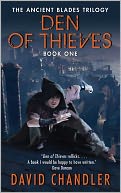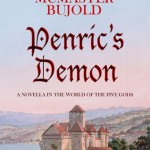 Sword and sorcery may be the lowest form of fantasy. When it’s a book like A Thief in the Night, by David Chandler, that’s a really, really great thing. Bad boys doing bad things for all the wrong reasons. Sounds like fun because it IS fun!
Sword and sorcery may be the lowest form of fantasy. When it’s a book like A Thief in the Night, by David Chandler, that’s a really, really great thing. Bad boys doing bad things for all the wrong reasons. Sounds like fun because it IS fun!
A Thief in the Night is the second book of The Ancient Blades. If you’re curious about book one, Den of Thieves, read this first. Book three, Honor Among Thieves, will be published in late November, 2011, and I’m very grateful to the publisher and Net Galley for letting me have a review copy. I’d hate to be waiting until after Thanksgiving to see how it all turns out. I dislike “middle-book syndrome” on general principles. Enough said.
 When last we left our heroes (I’ve always wanted to write that), they had just removed an evil sorcerer and his corrupted knight from the Free City of Ness. Permanently and with extreme prejudice. Malden, the thief of the title, had also learned more than was good for him about the way the city really works. In Malden’s case, if a little knowledge is a dangerous thing, a lot of knowledge is downright life-threatening.
When last we left our heroes (I’ve always wanted to write that), they had just removed an evil sorcerer and his corrupted knight from the Free City of Ness. Permanently and with extreme prejudice. Malden, the thief of the title, had also learned more than was good for him about the way the city really works. In Malden’s case, if a little knowledge is a dangerous thing, a lot of knowledge is downright life-threatening.
Sir Croy, the Ancient Blade, won the freedom of his lady-love, Cythera the witch’s daughter. At the beginning of Thief in the Night, Croy believes they will finally be married. There are a few problems with his plan. Their betrothal signing is interrupted by a bar-room brawl. Started by a Northern Barbarian. One who holds yet another Ancient Blade. Said Barbarian wants Croy to help him hunt down a demon. Croy loves demon hunting even more than he loves Cythera, so Croy leaves the betrothal unsigned to start outfitting the demon hunt. Cythera is just fine with the interruption, because that’s the other problem. Croy thinks she’ll be a good little knight’s wife once their married, and she’s not so sure about that. And anyway, she’s in love with Malden. Oops.
About that demon. The demon is holed up in the Vincularium. For those who read Tolkien, think of it as the Mines of Moria, only with a worse backstory. The dwarves buried a secret in the Vincularium, one they’ll do anything to keep buried. The humans buried one there too. History is written by the victors, or so it is said. In Malden’s world, where we say, “dead as a doornail”, they say, “dead as an elf”. The Vincularium is where the elves died. All the elves. Betrayed by their dwarven allies and killed by the humans.
But the Ancient Blades are sworn to kill demons. So Croy is going. His new friend Morget the barbarian is going. Cythera says she’s going. No one has signed those betrothal papers yet, so she’s still a free woman. And Malden, our thief–he wasn’t going. No profit in it. But…about those secrets. Someone in Ness wants him dead. Painfully. Sacrificed to the Bloodgod. Going to the Vincularium suddenly looks like the less painful option. Or at least a delay of the painful option. Delaying death is always good.
Escape Rating A: One of the things I love about sword and sorcery is the way that it turns high fantasy tropes upside down. The central character here is Malden, the thief. He is not a hero, and he doesn’t want to be. He’s a survivor. Croy is a typical hero, and he’s naive to a fault. Malden’s voice is much more fun to listen to, he’s sharper and smarter. Also more of a smart-ass.
Cythera is also a survivor. She was a virtual prisoner for many years. Croy represents safety and security, marrying him is the safe option. He will protect her. But he is incapable of understanding her. And yes, Malden loves her too.
 I enjoyed watching every one of the starting assumptions get knocked down. The demon isn’t exactly a demon. The dwarves aren’t just clever artificers and merchants–they are prevented from being warriors by treaty, and only as long as it suits them. The elves weren’t the villains that humans have always been taught. “Dead as an elf” isn’t actually correct, either. Dealing with the fallout from that is going to be fun in the next book.
I enjoyed watching every one of the starting assumptions get knocked down. The demon isn’t exactly a demon. The dwarves aren’t just clever artificers and merchants–they are prevented from being warriors by treaty, and only as long as it suits them. The elves weren’t the villains that humans have always been taught. “Dead as an elf” isn’t actually correct, either. Dealing with the fallout from that is going to be fun in the next book.








